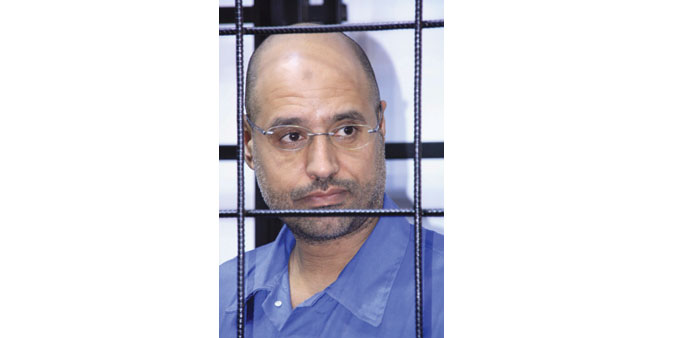Rights groups say the trial missed an opportunity to expose the crimes of the Gaddafi regime
AFP
Tripoli
A Libyan court yesterday sentenced a son and eight aides of slain dictator Muammar Gaddafi to death for crimes during the 2011 uprising, in a verdict denounced by rights campaigners.
The United Nations also said it was “deeply disturbed” by the outcome and criticised the trial for failing to meet international standards.
Saif al-Islam, the strongman’s one-time heir apparent who is also wanted by the International Criminal Court (ICC), was tried in his absence because he is held by militia opposed to the Tripoli authorities.
Former intelligence chief Abdullah Senussi and Gaddafi’s last prime minister Al-Baghdadi al-Mahmudi were also sentenced to death, although they can appeal to the supreme court.
The 37 defendants were charged with crimes including murder and complicity in incitement to rape during the revolution.
Libya has been wracked by conflict since Gaddafi’s overthrow, with rival governments and powerful militias battling to control key cities and the country’s oil riches.
The trial, which opened in the capital in April last year, has been dogged by criticism from rights watchdogs and an unresolved dispute with the ICC in The Hague over jurisdiction in the case of Gaddafi’s son.
The UN’s Office of the High Commissioner for Human Rights said yesterday that there were “serious issues relating to access to lawyers, claims of ill-treatment, and trials conducted in absentia”.
Rights groups say the trial missed an opportunity to expose the crimes of the Gaddafi regime.
Amnesty International called the death sentences “appalling”.
“Instead of helping to establish the truth and ensuring accountability for serious violations during the 2011 armed conflict, this trial exposes the weakness of a criminal justice system which is hanging on by a thread in a war-torn country with no central authority,” Amnesty’s Philip Luther said.
Human Rights Watch’s Joe Stork said the trial was “plagued by persistent, credible allegations of fair trial breaches that warrant independent and impartial judicial review”.
The militia holding Saif al-Islam in the southwestern hill town of Zintan is aligned with the internationally recognised government which fled to the remote east last August when a rival militia alliance seized Tripoli and set up its own administration.
Prosecutor general Siddick al-Sour acknowledged that there was no prospect of Saif al-Islam facing the court’s sentence any time soon, but said that was a matter for politicians.
“The court pronounced sentence and has nothing to do with the political conflict,” Sour said.
Saif al-Islam’s sole appearances before the court were by video link and there had been none since May last year.
The UN Security Council referred the conflict in Libya to the ICC in February 2011 amid Gaddafi’s repression of the popular uprising against his decades-old regime.
Saif al-Islam is wanted by the ICC on charges of war crimes and crimes against humanity.
ICC prosecutors say that as part of his father’s “inner circle”, he “conceived and orchestrated a plan to deter and quell, by all means, the civilian demonstrations against Gaddafi’s regime”.
Muammar Gaddafi, who ruled Libya for four decades, was captured and killed by rebels in October 2011.
Three of his sons died in the uprising. Another, Saadi, was extradited to Libya from Niger in March 2014.
Saif al-Islam has been held in Zintan since his capture in November 2011 despite repeated ICC demands for Libya to hand him over for trial.
Twenty-nine other defendants, including Senussi and Mahmudi, were in court for yesterday’s sentencing.
They were brought into the black cage in blue prison uniforms, some with their heads shaved. Most sat impassively in the dock.
Senussi has been in custody since September 2012 when he was handed over by Mauritania, where he had sought refuge after the regime’s overthrow.
“He has from day one had no effective legal representation, no access to his family and the outside world, and no ability to prepare any defence against the charges,” his international legal team said.
His 17-year-old daughter Salma said her father had been denied a fair trial.
“Even if my father did something wrong, I would ask them to put him in a real court in a place with rule of law,” she said, speaking from her home in Britain.
The court sentenced eight other defendants to life in prison, seven to 12 years, four to 10, three to six and one to five.
Four were acquitted and one was ordered confined to a psychiatric hospital.

Saif al-Islam attends a hearing behind bars in a courtroom in Zintan in this May 15, 2014 file photo.
